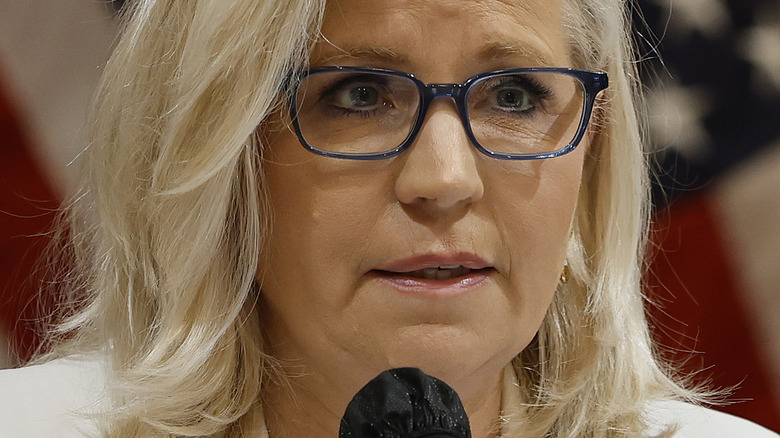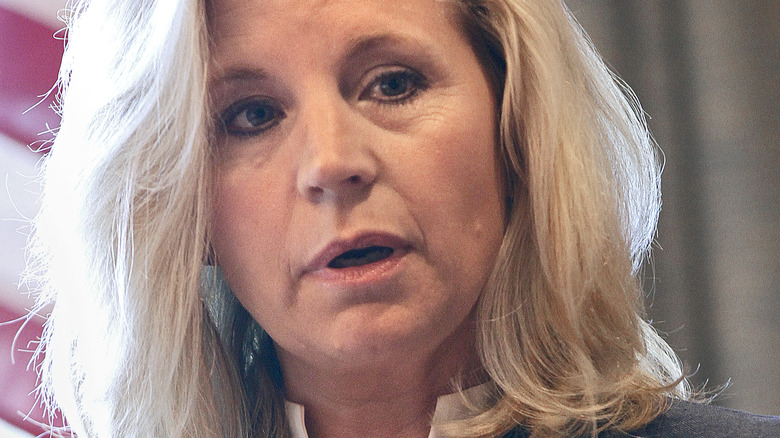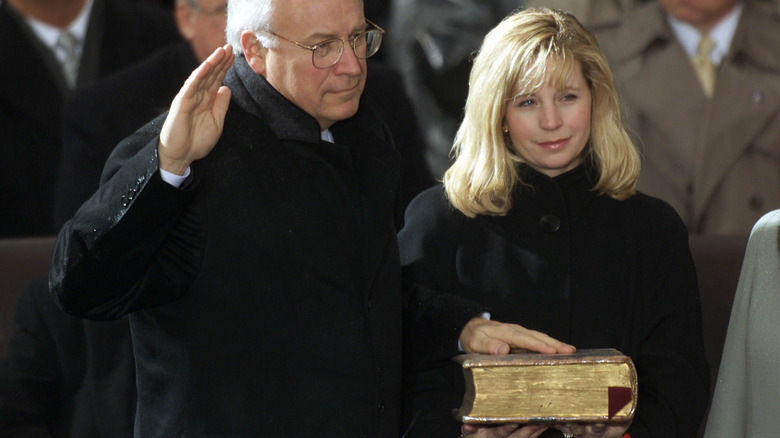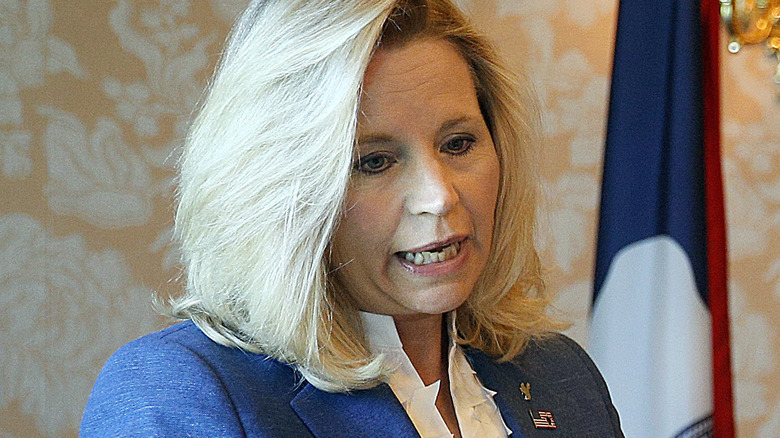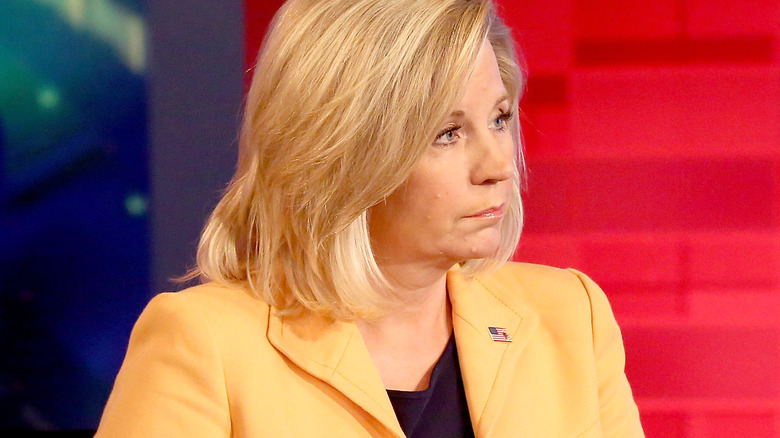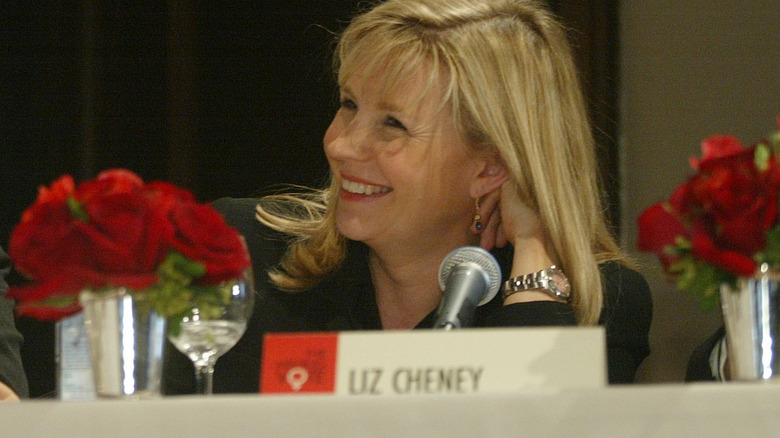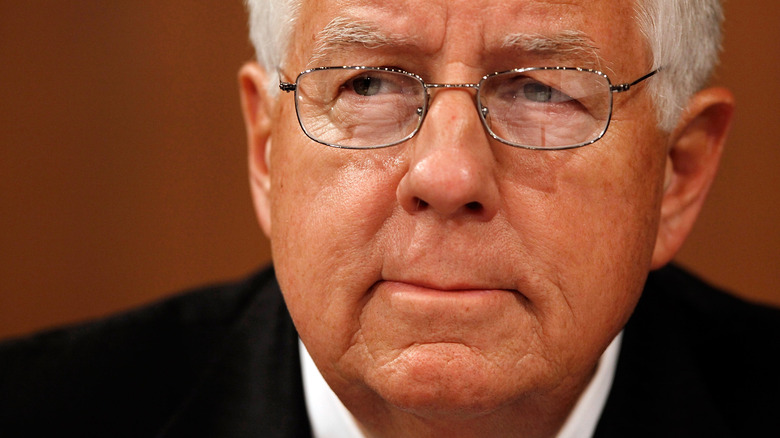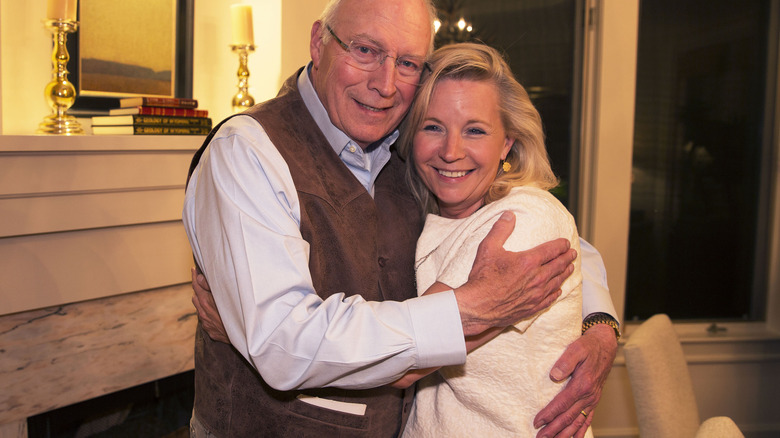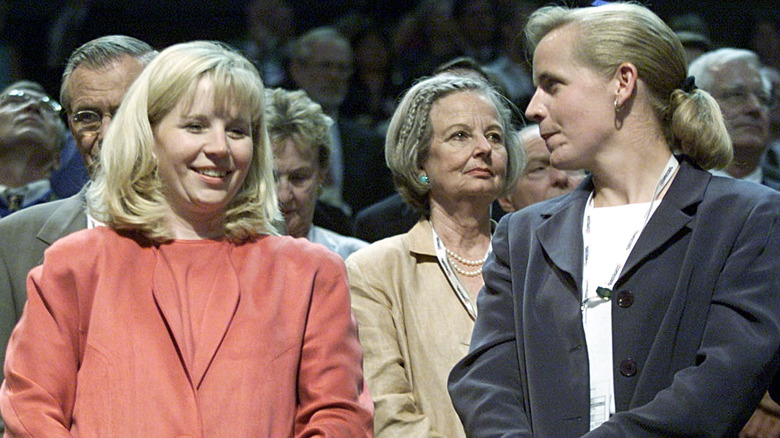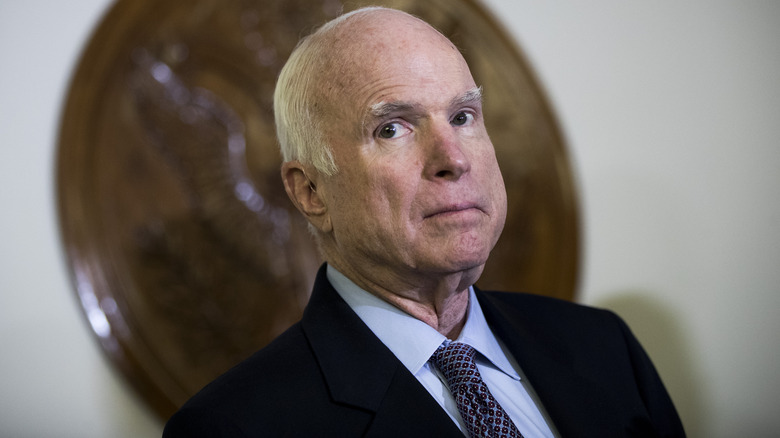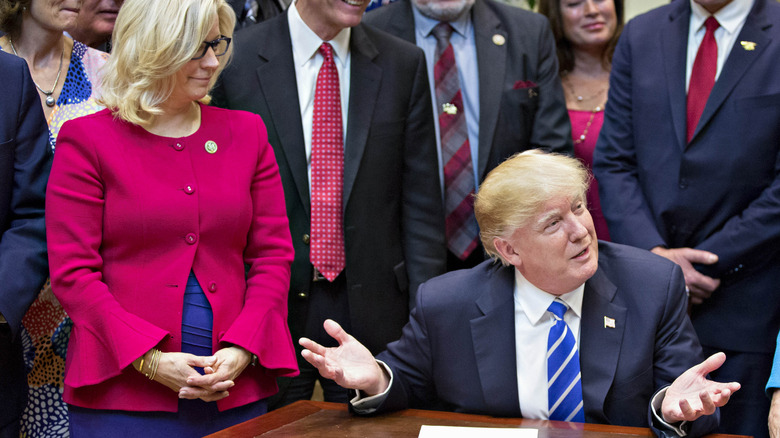The Untold Truth Of Liz Cheney
What a difference a decade makes. In 2010, it was impossible to imagine that Democrats and any neoconservative figures aligned with former Vice President Dick Cheney would be friendly, to say nothing of his daughter. Liz Cheney embraced the idea of being an obstructionist of the Obama administration's policies during her U.S. Senate campaign in 2013, as reported then by the Wyoming Tribune Eagle. She chastised fellow conservatives for compromising too often with liberals and adopted incendiary rhetoric about President Barack Obama "literally declaring war" on various segments of the American populace.
From 2020 on, however, the Liz Cheney described in headlines seems like a completely different person. She has openly opposed former President Donald Trump and the Republican leadership in Congress — of which she was a part until 2021, per NPR — that have subjected themselves to him.
Trump's refusal to accept the results of the 2020 presidential election and the Capitol insurrection on January 6, 2021, proved a bridge too far for Cheney. She voted to impeach Trump and has played a significant role on the House select committee probing the insurrection. Her actions have come with a political cost: Cheney lost her bid for reelection to Wyoming's lone Congressional district in 2022 (per Politico).
Rep. Cheney's defiance of Trump has brought her considerable praise from her one-time foes across the aisle. But the wide gap between her policies and those of most Democrats remains, and some on the left are not prepared to uncritically accept her as an ally (see 1945).
She's been in politics a long time
Rep. Liz Cheney has only held elected office since 2016; when she won Wyoming's sole Congressional district (via Cheney's official congressional website). But her interest in politics stretches back to her college days. In 1984, she enrolled in Colorado College, majoring in political science. Her senior thesis was "The Evolution of Presidential War Powers," according to the "Current Biography Yearbook 2010." Perhaps unusual for a student at a liberal-arts college — but typical for the daughter of Dick Cheney — she argued for nigh unlimited authority for the president during wartime.
In 1989, after graduating from Colorado College, Cheney found work in the government, specifically on the staff of the United States Agency for International Development (USAID). In that capacity, she was responsible for furthering the agency's mission of offering material aid to developing nations. Cheney later worked in the former Soviet bloc at various American embassies under Richard Armitage, per The New York Times.
As told in the "Current Biography Yearbook," when Armitage left the government to found the consulting firm Armitage Associates in 1993, Cheney followed him into the private sector, but she continued to take an interest in state affairs. She studied law at Chicago Law School and Middle Eastern history at the Oriental Institute of the University of Chicago. Her first work as a lawyer was with an international law firm, and she later made use of her USAID experience while working on investments in the Middle East by the IFC, a private lending arm of the World Bank.
Was her State Department job created for her?
In 2002, Liz Cheney became the Deputy Assistant Secretary of State for Near Eastern Affairs, per her Congressional biography. Though her earlier work for USAID and the IFC seemed a strong recommendation for the role, there were suspicions in the media. After all, Liz's father Dick Cheney was now vice president, and she wasn't the only relative of a high-ranking Bush official to find easy work in the administration. The New York Times columnist Paul Krugman entertained the idea that Cheney's job was created specifically for her.
Even if the position wasn't created for Cheney, federal law prohibits public officials from appointing or hiring relatives in agencies they have control over. As vice president, Dick Cheney may not have been directly in charge of the State Department, but suspicions of nepotism were hard to avoid. Spokesperson Richard Boucher insisted that it was otherwise, that Secretary of State Colin Powell had chosen Cheney for deputy assistant secretary and that the position had existed, vacant, for over a year (per the Times).
Cheney would ultimately spend only a year in the job. She left in 2003 to work on the reelection campaign for President George W. Bush and her father (per the "Current Biography Yearbook 2010"). But after the campaign, she returned to the State Department in an expanded role as principal deputy assistant secretary and coordinator for the Broader Middle East and North Africa Initiative (per the State Department archives).
Her Iran policy group was disbanded
In 2006, amidst rising tensions between the United States and Iran over the latter's nuclear program and sponsorship of terrorism, the State Department created a new agency, headed by Liz Cheney. The Iran Syria Policy and Operations Group (per the Boston Globe) was intended to disrupt the regimes of both countries. Part of their work involved spending money on individuals and groups working to affect change within Iran. But according to The New York Times, there was a significant hurdle: no group with a chance of having influence could afford a direct association with the American government. No one willing to step forward could be verified as being a good investment.
The Iran group faced other problems. Iran itself accused the agency of meddling, and others suspected more. The U.S. had already martialed diplomatic pressure against Iran, but allies in Europe and Asia worried the new agency aimed to replace the existing government there. "They don't call it 'regime change,' but that's obviously what it is," one diplomat anonymously told the Times. Reports leaked that the agency was considering military ventures. And a similar group had been established prior to the invasion of Iraq in 2002, strongly supported by Cheney (per TIME).
By the end of 2006, the Bush administration changed its tack. Iran and Syria were needed to help stabilize the situation in Iraq. Secretary of State Condolezza Rice entered into diplomatic engagement with both countries, and Cheney's agency was quietly disbanded.
Keep America Safe
Donald Trump's slogans of "Make America Great Again" and "Save America" have attracted derision, particularly after his refusal to accept the results of the 2020 election and the January 6 insurrection. Liz Cheney's ongoing criticism and investigation of Trump certainly aren't the actions of someone who thinks he's going to "save" America. But at one time, she was prepared to engage in the same sort of rhetoric with the name of one of her organizations.
Cheney, writer Bill Kristol, and lawyer Debra Burlingame co-founded the nonprofit group Keep America Safe (per ThinkProgress). The group's stated goal was "to provide information for concerned Americans about critical national security issues," according to an archive of their website. It voiced concern over growing security threats from Russia and China, the ongoing war on terror, and the shift in foreign policy under the Obama administration, which Keep America Safe accused of "weakening the nation."
Not long after forming, Keep America Safe was subject to harsh criticism, and not from the political left. The organization questioned the values and loyalty of lawyers who represented terrorist suspects and later entered the Justice Department, smearing them as the "Al Qaeda Seven." Numerous conservative officials denounced the attack, pointing to the American tradition of offering even despised suspects fair legal representation. "There has to be some space to disagree without someone running an ad suggesting you're an Al Qaeda agent," said Benjamin Wittes of the Brookings Institution at the time (per Politico).
She flirted with the birthers
For over five years, Donald Trump loudly trumpeted the conspiracy theory that President Barack Obama was not born in the United States, known as birtherism. Per ABC News, he had pushed for the public release of Obama's birth certificate since 2011, and continued to question its authenticity up until his first run for president in 2016. Liz Cheney never embraced the falsehood to the degree that Trump did, but she showed a similar willingness to entertain it years before Trump began meddling in Republican politics.
While appearing on "Larry King Live" in 2009 (via Media Matters for America), Cheney was asked about birtherism. While Cheney did eventually reject the claim that Obama was born in Kenya, she offered a defense for people who believed so. "One of the reasons you see people so concerned, I think this issue is, people are uncomfortable with having for the first time ever, I think, a president who seems so reluctant to defend the nation overseas."
The following year, Cheney gave a speech before the Center for Security Policy. While the CSP was originally viewed as a respectable foreign affairs think tank, the Southern Poverty Law Center has since branded it a far-right, anti-Muslim hate group. Its founder, Frank Gaffney, has regularly promoted conspiracy theories, including birtherism (according to Reason Magazine). Cheney didn't echo birtherism in her CSP speech, but she did claim that the "Obama doctrine" consisted of apologizing for America, abandoning allies, and appeasing enemies in the Middle East.
Her run for Senate was taken as a betrayal
Dick Cheney grew up in Wyoming. He finished college there, and he represented the state in the House of Representatives for six terms (per Britannica). While he spent much of his time in Washington, his Wyoming roots were seen as solid. By contrast, his daughter Liz Cheney was born in Wisconsin, grew up in Washington, D.C., and spent her adult life in Virginia until she decided to run for the U.S. Senate in 2013 (also per Britannica). Almost immediately, she was accused of being a carpetbagger. "It's a unique strategy to live your entire life elsewhere and then come to the state a year before you're going to announce that you're going to run for that state's highest office," said then-representative Cynthia Lummis (per The Washington Post).
Cheney countered by emphasizing her familial connections to Wyoming, but carpetbagging wasn't the only weighty charge leveled at her. The Senate seat she was gunning for was filled by Mike Enzi, a well-liked member of the Republican caucus with solid conservative bona fides. A number of Republican observers felt Cheney's run came more from naked ambition than any need for new representation. Enzi, who had often rubbed elbows with the Cheneys, seemed to take the challenge hard. "I thought we were friends," he said during the campaign.
Between both issues, Cheney faced long odds (per Politico). When her family faced a health crisis around her children, she dropped out of the race.
She's devoted to her dad
The apple doesn't fall far from the political tree in the Cheney family. Liz Cheney was a political asset to her father Dick from a young age. Per The Washington Post, she helped push her father as a congressional candidate in 1978. When Liz ran for the U.S. Senate in 2013, Dick returned the favor. From 2016 to 2022, daughter literally filled father's old seat in the House of Representatives as congresswoman for Wyoming's lone district (per The Florida Times-Union).
Like Dick, Liz is hawkish on national security and opposed the energy policies of the Obama administration. Aides, colleagues, and family friends have reported that they have similar personalities and management styles, according to Politico. Since the end of the Bush administration and Liz's ascendency in national politics, Dick has been her closest adviser. "She's not just her father's daughter," her friend Bill Kristol has said of Liz, but she consults with Dick on all major decisions.
Besides being politically aligned, the Cheneys are devoted to one another. They've co-written several books together and are quick to defend the other. Politico compared their bond to that between John Adams and John Quincy Adams, and noted the considerable energies both progeny put toward defending their fathers' legacy. And Dick, who had reservations about Donald Trump since before the 2016 election, kept them muted out of respect for Liz's political career until Liz herself turned on Trump.
Cheney vs. Cheney
Family bonds have been consistently strong between father and daughters in the Cheney family; both Liz and Mary Cheney dote on their father Dick, according to Politico. But politics came between the sisters in 2013, during Liz's ultimately doomed bid for one of Wyoming's Senate seats. At a time when gay marriage was a divisive national issue and a powerful wedge in Republican politics, Mary Cheney's open homosexuality was a liability for Liz in ruby-red Wyoming.
The Cheney family had been supportive of Mary. In her autobiography "Now It's My Turn," she wrote that her father accepted her sexuality immediately. Dick even voiced some support for gay marriage, contra the Bush administration's position, during the 2004 election (per The Washington Post). But when Liz faced political ads painting her as a proponent of gay marriage in 2013, she issued an unambiguous statement opposing it, which brought swift condemnation from Mary Cheney. "Liz's position is to treat my family as second class citizens," she wrote on Facebook (via the Post). Mary went as far as refusing to support her sister's candidacy.
Liz blamed her opponent, Mike Enzi, for bringing the issue into public view, without acknowledging that her position denied her sister basic rights. The siblings were not on speaking terms for some time after the Senate race. But in a 2021 appearance on "60 Minutes," Liz turned around on the issue of gay marriage. "I was wrong," she said. The same year, Mary voiced support for Liz on Facebook.
She used John McCain as a campaign punching bag
When running for U.S. Senate in 2013 and the House of Representatives in 2016, Liz Cheney had to walk a fine line between presenting herself as outside and acknowledging her and her family's long experience in Washington. In pursuit of a maverick image, she took aim at another maverick: Arizona Sen. John McCain. When McCain endorsed incumbent Wyoming Sen. Mike Enzi in 2013, Cheney branded him a "liberal Republican" who preferred the status quo of the Obama administration to any upsets (per Politico).
McCain brushed off the label through a spokesperson, but it was more than electioneering that divided him from Cheney. In 2018, McCain raised concerns about President Donald Trump's nomination of Gina Haspel for CIA director. Haspel had been involved in the CIA's Enhanced Interrogation Program, championed by former Vice President Dick Cheney during the Iraq War and widely condemned as torture. McCain, subjected to torture himself during the Vietnam War, was an outspoken opponent of its perpetration by American officials, while Cheney — both Cheneys — embraced the program.
As representative, Cheney rebuked McCain's concerns about Haspel. McCain's daughter Meghan was quick to come to her dad's defense. "My father doesn't need torture explained to him," she tweeted (via CNN). But several years later, when Meghan and Liz were aligned in opposition to Trump and his false statements about the 2020 election, the former came to the latter's defense (via People).
She was all for Trump (at first)
The opposition to Donald Trump that has brought Liz Cheney unlikely admirers on the left is a recent development. While the Cheney family and their political allies found Trump and his agenda distasteful, they lined up behind him in the 2016 election (per Politico). As a U.S. representative, Cheney offered some disagreement to the Trump administration, mostly on foreign policy, but declined to condemn Trump's frequent outbursts and shows of prejudice. She even defended them at times.
By her own admission on "60 Minutes," Cheney voted with Trump 93% of the time. "His policies were the right ones in many ways," she claimed. In 2019, she and Kentucky Sen. Rand Paul got into a war of words over who was "Trumpier," an intra-party fight which involved Cheney dredging up an old, mocking tweet of Trump's aimed at Paul, according to The New York Times.
The breaking point, Cheney told "60 Minutes," wasn't policy or character; it was the 2020 election and the January 6 insurrection. And she claims to have significant silent support from fellow Republicans who publicly support Trump but privately reject him. "The argument that you often hear is that if you do something that's perceived as against Trump, that you'll put yourself in political peril," Cheney said, to explain the public stance of so many Republicans. "[But] if Republican leaders don't ... condemn what happened, then the voices in the party that are so dangerous will only get louder and stronger."
